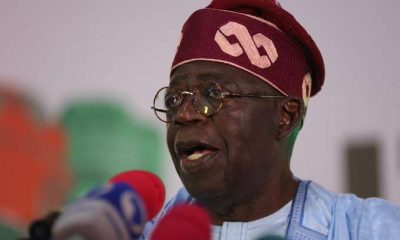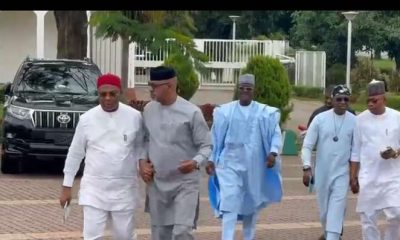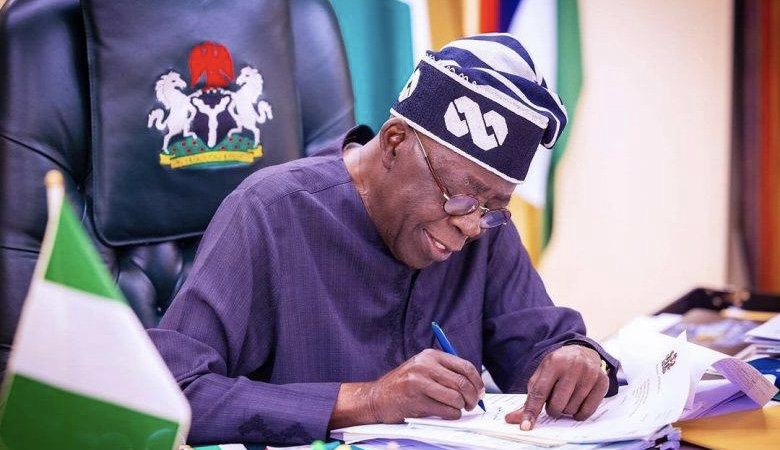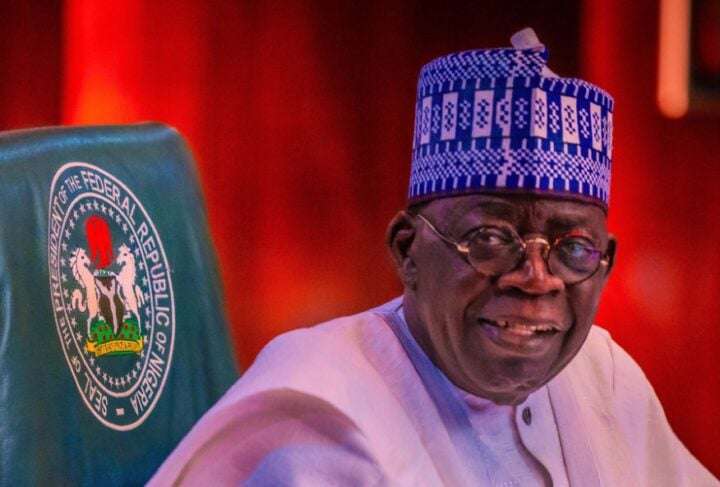Headlines
Buhari, Tinubu loyalists at war over economy
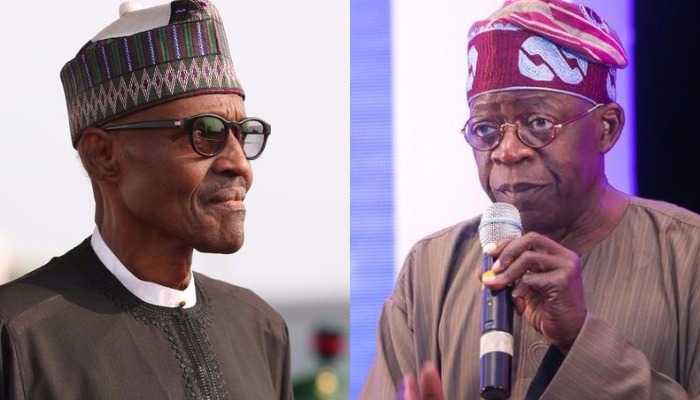
By Obinna Ezugwu
For its failures every step of the way in eight years, the immediate past administration of President Muhammadu Buhari found convenient whipping boys in his predecessor, Goodluck Jonathan and his party, the People’s Democratic Party (PDP), who ‘destroyed the country and its economy for 16 years.’ But by the time he was done, every developmental and economic index had gotten much worse than under the PDP, and Buhari has found himself in the same boat he had put Jonathan, with his successor, Bola Tinubu and his foot soldiers already pointing to the level of economic destruction that occurred under his watch, as the sole reason for the current heightened suffering in the land, a development that has set both camps up for collision.
But amid the blame games, many have continued to point out that it’s disingenuous for the new government to turn around and blame the previous one after supporting its policies for eight years.
“Tinubu supported and defended the ruinous policies of the disaster that was Buhari, on the partisan altar of the APC,” said Ose Aneni, a member of the People’s Democratic Party (PDP). “So yes, they inherited a damaged country; but remind them that they helped destroy it, too.”
Succeeding regimes blaming proceeding ones for poor economic and social outcomes is not new. It has been the pattern since the era of military coups from the 70s all the way to late 90s. Indeed, new coups were blamed on the failures of existing regimes by generals, who then ended up worse than those they toppled.
The 1983 coup that brought Buhari as head of state was on the surface, necessitated by the profligacy of the Shehu Shagari administration. But by the time the General Ibrahim Babangida (rtd) intervention came in 1985, things had become much worse, and the country’s fragile unity had become even more precarious.
However, what has started to play out under Tinubu may not have been anticipated by many. The emergence of Buhari as president in 2015 under the All Progressives Congress (APC) was credit in large part to Tinubu, with the former Lagos governor and his camp strongly backing him for second term and all the way till the end.
Buhari reciprocated this support by backing him as his successor, such that the May 29, transition was a smooth hand over of power from one ally to another. But things appear to be falling apart quickly, with many in the Tinubu camp blaming the Buhari government for destroying the economy, and the Buhari camp fighting back.
“They (Tinubu camp) defended the man when the rest of us were telling them that the country was being ruined by Buhari, the mannequin,” said Olasupo Jakes, @JakesOlasupo, a social media commentator. “Even Tinubu was praising Buhari then.”
It was Adams Oshiomhole, ex-Edo State governor, who served as national chairman of the APC before he was booted out in an intricate Aso Rock power play, that first fired a shot at the Buhari regime.
Speaking during an interview with journalists shortly after his meeting with the Vice President, Senator Kashim Shettima, at the Presidential Villa, Abuja on Tuesday, August 15, the senator representing the Edo North Senatorial District, argued that Tinubu inherited a terrible economic situation from the past administration.
“The government inherited a terrible economic situation, everybody knows it,” he had said. “The government inherited an economy in which the total national revenue was barely enough to service our debt burden. Spending 96 per cent; which is to say every one hundred naira Nigeria earns, ninety-six kobo is to pay debt.”
Tinubu had on his inauguration day, announced the withdrawal of fuel subsidy, and perhaps for good reason. Riddled with corruption, it was costing the country a fortune it could no longer afford. But many say it was badly done without proper planning. The administration also opted to float the naira, which sent the local currency on a spiral of depreciation.
The withdrawal of fuel subsidy has since sent pump price from N180 per litre, to over N600, which combined with the tumbling naira, has worsened inflation and compounded the suffering of Nigerians. The administration has since partially walked back on the two policies. There’s been intervention in the Forex market, while subsidy has partly returned. But the hardship has been unabated.
The president insists the pains are temporary, but the complaints are getting louder, even as many say that, while encouraging Nigerians to sacrifice, Tinubu has not conducted himself in a manner to suggest he is willing to lead by example in this regard. Wasteful foreign trips have continued.
The N2.176 trillion supplementary budget he submitted to the national assembly last month – which had since been passed with slight changes – included the purchase of N5bn presidential yatch, N2.9 billion for purchase of SUV vehicles; the purchase of official vehicles for the office of the First Lady (N1.5 billion); renovation of the residential quarters of Mr. President (N4 billion); renovation of Dodan Barracks—the official residence of Mr. President (N4 billion); renovation of the official quarters of the Vice President in Lagos (N3 billion); construction of an office complex in Aso Rock (N4 billion); N12.7billion for presidential fleet, among others.
The office of the first lady is not recognised in the constitution, and it would be the first time funds for such unconstitutional office would be openly reflected in the budget. This, and many other provisions of the budget did not sit well with many, who accused the president of abusing his office and embarking on frivolous spending of public funds at a time many Nigerians are struggling as a consequence of his administration’s policies.
The president also named a bloated cabinet. His list of 48 ministers is the largest since the return of democracy in 1999, inevitably increasing cost of governance many had argued was already too high. To this end, many insist that while there might be a point in blaming the Buhari regime, the Tinubu government cannot absolve itself of blame going by how it has conducted its affairs thus far.
“Tinubu’s government is bogus and extravagant,” noted activist lawyer, Malcolm Omirhobo. “He is not spending like a president, who inherited a bankrupt country. If he fails to stop over spending and taking useless loans, Nigeria will be sold under his watch.
“Agreed your government inherited serious liabilities, but to succeed, stop creating grave liabilities. Cut down cost of governance. Stop squandering our common wealth. Stop taking useless loans.”
But the Tinubu government and its supporters have been bullish in pointing out the challenges inherited, and pointing fingers at Buhari, a situation that has prompted responses from the former president’s camp.
When Tinubu marked his first 100 days in office in September, his Minister of Information and National Orientation, Mallam Mohammed Idris, said in a statement that his principal, “inherited a battered economy but changed the narrative within his 100 days in office.”
It has been the singsong. Speaking at an interdenominational church service to commemorate Nigeria’s 63rd Independence Anniversary on October 2, Nigeria’s first lady, Remi Tinubu, also said her husband, is working hard to fix a damaged country he inherited, stressing that the president is not a magician, who will fix things with the wave of the wand.
“All we inherited are things that had happened many years ago; we are not here to put blame on any administration but to fix what has been damaged,” she said. “My husband is not a magician; he is going to work and I believe and hope that we will have peace in this country; the best is yet to come to us.”
Tinubu himself while in Mecca, Saudi Arabia, early last month, said his administration inherited serious liabilities from his predecessors, lamenting that Nigeria has serious deficits in port and power infrastructure, as well as agro-allied facilities. But at the same time, said he would not make any excuses as his government also inherited assets.
Mr. Wale Edun, the Minister of Finance and Coordinating Minister of the Economy, while fielding questions from journalists at the end of the inaugural Federal Executive Council meeting in August, also said that the Tinubu administration met a very bad economy with inflation at 24 per cent.
Asked to describe the kind of economy the government met on the ground, he said, “Per capita had fallen steadily, inflation is at 24 per cent, unemployment is high, you know they are rebasing the way in which it’s calculated.
“Either way, it is high and youth unemployment is even unacceptably high, these are the key metrics that we have met.”
Asked to be specific on the state of the economy they met on the ground, the minister said, “We met a bad economy but the promise of Mr. President is to make it better. “
Dave Umahi, the Minister of works equally said in a statement that the Tinubu-led government inherited a debt burden of over N6 trillion from the ongoing road projects in the country that Buhari handed to him.
Nuhu Ribadu, the National Security Adviser, also last month, lamented that the current administration inherited a bankrupt country from Buhari, noting at the Chief of Defence Intelligence Annual Conference 2023 in Abuja, that the revenue generated by the Tinubu-led administration is being used to repay what was taken from the country.
“Yes, we’re facing budgetary constraints. It is okay for me to tell you. Fine, it is important for you to know that we have inherited a very difficult situation, literally a bankrupt country, no money, to a point, where we can say that all the money we’re getting now, we’re paying back what was taken. It is serious!” he said.
“But this administration is doing its best to meet our requirements, particularly the armed forces, and I believe that you leaders will be able to testify to that,”
Speaking in an interview with Channels TV fortnight ago, Charles Soludo, governor of Anambra State, equally made the point that Tinubu inherited a dead economy.
“This particular government (Tinubu’s) inherited a dead economy. From a macroeconomic point of view, this government inherited a dead economy like a dead horse that is still standing. But people did not know it was dead. You cannot pour water on a rock and expect that the rock will not be wet,” he said.
“There are humongous challenges and I think it is important that Nigerians understand this and it is not a tea party.”
Last week, Governor Dapo Abiodun of Ogun State equally argued that Tinubu inherited an “almost comatose” administration.
“The President Bola Ahmed Tinubu’s administration has been very bold and audacious. They have taken the bull by the horns. They have done what no other government has done in the history of Nigeria,” he said on Channels Television’s Sunday Politics.
“They have had to deregulate to save Nigerians and they deregulated at a time when the pricing of petroleum was at the largest margin. But knowing fully well, they either did that then or the country would be brought to its knees. Like they said, there can’t be any gain without pain. He has inherited an administration that was almost comatose.”
But the blame game has not gone down well with Buhari’s supporters, many of who have been voicing out their disapproval in what points to a possible crack between the CPC and ACN camps; the two main groups that merged to form the APC in 2013.
In a statement on Sunday, a group, Protectors of PMB Legacy, warned the current holders of power against discrediting Buhari’s achievements, noting that it is unfair to say the former president did nothing to move the country forward during his eight-year administration.
The coordinator of the group, Mohammed Ajiji, in the statement in Kaduna, said, “We are being compelled to address some claims asserting that the government of former President Muhammadu Buhari has not achieved anything during its tenure. Such assertions are not only misleading but also disregard the numerous accomplishments documented on the PMB scorecard website: www.pmbscorecard.gov.ng.
“We were actually blown away when we stumbled on the site and discovered the quantum of projects executed by the PMB administration.
“Contrary to the misinformation being circulated, the Buhari administration has made significant strides across various sectors, contributing to the overall development and progress of Nigeria.
“We encourage all concerned citizens and members of the media, musicians, political critics and other interest groups to visit the PMB scorecard website, which meticulously outlines and provides transparent insights into the achievements of the government.”
Garba Shehu, ex-Senior Special Assistant (Media & Publicity) to the former President also countered the claims by the Tinubu camp, noting that his principal did well.
“Our leader, Muhammadu Buhari, has done well. And if people fail to talk about that now, perhaps they will talk about that in the future. They would be fair to him and talk about the good things he did in the country,” he told BBC Hausa recently.
“If there were hardships or problems, these should be looked into, to know how they came about. There is no administration in this country that found itself in economic problems like Buhari’s, because of our dependence on oil, which prices went down.
“We also had the coronavirus pandemic. Nations shut their doors and the economy plummeted. But Buhari brought the Nigerian economy out of that crisis.”





